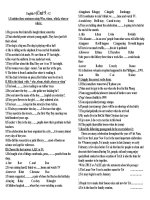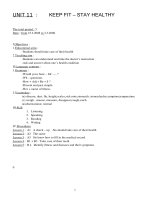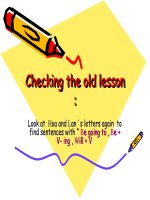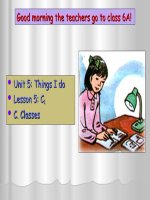unit 1_lesson plan10
Bạn đang xem bản rút gọn của tài liệu. Xem và tải ngay bản đầy đủ của tài liệu tại đây (351.34 KB, 9 trang )
Grade level: Upper-secondary school
Subject: English
Period 5: Language Focus
I. Duration: 45 minutes
II. Description:
- T uses tapes to help Sts to distinguish 2 different clutters / i / and / i: /
Sts repeat several times so that they can identify the sounds and reproduce
them later.
- T reminds Sts remember - 2 tenses: The present simple and the past
simple.
- Adverb of frequency to do exercises.
III. OBJECTIVES
* Language: - Correctly pronounce /i/ and /i:/
- Sts will be able to use the simple present, simple past
and adverbs of frequency
* New words: - Adverbs of frequency
IV. METHOD: Integrated, mainly communicative
V. TEACHING AIDS: tape, a cassette player, pictures cards
VI. PROCEDURE
TIME TEACHER’S ACTIVITIES STUDENTS’
ACTI
VITI
ES
(3ms)
(20ms)
I. Warm up
- Asks Ss to close their books.
- Sticks a picture of 1kg of fish is 2£ and 1kg of meat
is 5£.
1£ 5£
- Asks Ss to look at the picture and complete
sentence:
The fish is ……….and the meat is ………
=> the fish is cheap and the meat is expensive.
- writes the description of 4 underlined words
the fish is cheap and the meat is expensive
/ fi∫/ / t∫i:p/ / mi:t/ / iks'pensiv/
II. Pronunciation
Lead-in
- Gets Ss pay attention to the pronunciation of
“fish”, “expensive” and “cheap”, “meat”
/i/ /i/ /i:/ /i:/
- Checking.
- Leads to the lesson.
Presentation Practice
Activity 1
- Close their
books.
- Look at the
picture.
- A student reads
the sentence
loudly.
- Listen.
(20ms’)
- Pronounces two sounds: /i/ & /i:/
/i:/ the front of tongue is raised. The mouth is nearly
closed. The lips are spread.
/i/ the front of tongue is raised. The mouth is half
close. The lips are spread.
- Asks Ss to repeat.
- Introduces some words that have the sounds /i/
and /i:/
/i/ /i:/
hit heat
bit beat
meet meat
kick repeat
- Asks Ss to practise pronouncing them.
Activity 2
- Asks Ss to open their books and work in pairs
finding the words which have /i/ or /i:/
- Lets them listen to the tape (or the teacher) and
repeat. (Pay attention to the sentence stress.)
II. Grammar and vocabulary
- Lead-in
-gives an example:
She often eats ice-cream everyday but yesterday she
ate cake because she had a sore throat.
Activity1
-Ask one St to tell the form of the present simple
tense on the board.
-Asks one Sts to present the use of the tense in
- Listen and
repeat
- Open their
books.
- Work in pairs.
- Listen and
repeat.
-Some Ss retell
the points.
Vietnamese.
Reminds Sts:
+ Form: (+) S+V(s/es)
(-) S + don’t/doesn’t + V
(?) Do/ Does + S + V
+ Use: * Express a fact that is always true.
* Express an action that happens again and
again, that is a habit.
* Express a fact which stays the same for a
long time.
Exercise 1
- Explains how to do the task.
- Does some examples and asks Sts to do exercise .
- Calls some Sts to read their answers.
- Corrects them
Keys:
1. is 2. fish 3. worry 4. are
5. catch 6. am 7. catch 8. go
9. give up 10. says 11. realize 12. Am
Activity 2
Draw a line to show how the adverbs of frequency use
0% 50% 100%
Never Rarely Not often Sometimes Often Usually Always
- - Gives an example:
I often go shopping with friends at weekend.
- Listen.
Do exercise
Check the
answers
Note in their
notebooks
Listen and write
on their
notebooks.
- Expresses and shows the position of adverbs of
frequency:
Adverbs of frequency stand before ordinary
verbs
Eg. He usually goes to bed at 10.30.
Between auxiliary verb and main verb
Eg. I don’t often get up early.
Adverbs of frequency stand after “to be”
Eg. He is never interested in Maths
- Gives Sts an exercise: Rearrange the position of
adverbs of frequency in these sentences. ( if it’s
necessary)
1. I go usually to bed at 12
2. I often don’t go swimming
3. He eats never meat.
4. He sometimes is late for school.
5. I’m usually in a hurry in the morning.
- Asks Sts to do this exercise and checks.
Keys:
1. I usually go..
2. I don’t often go…
3. He never eats…
4. He’s sometimes late..
5. Right.
Do exercises









